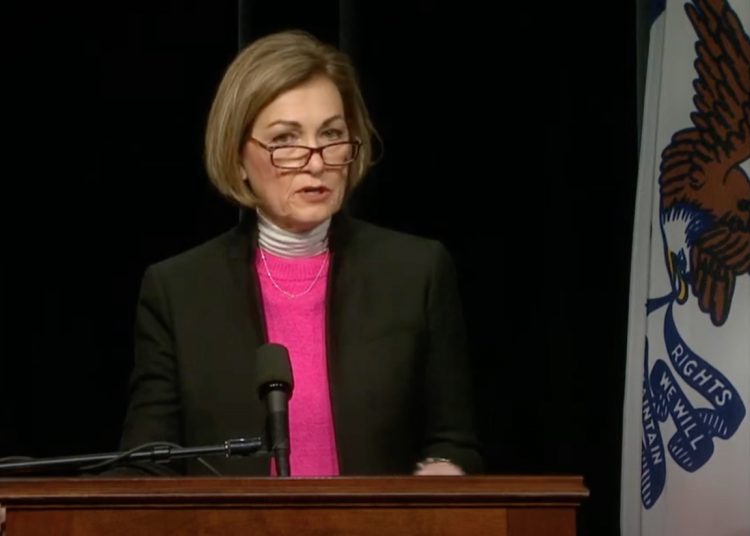DES MOINES, Iowa – Republican Gov. Kim Reynolds on Thursday said that given the opportunity she would have joined the Republican Texas Attorney General Ken Paxton’s lawsuit against Georgia, Michigan, Pennsylvania, and Wisconsin filed with the Supreme Court on Monday over the 2020 presidential election.
Paxton said that the four battleground states ran illegal and unconstitutional elections.
“Trust in the integrity of our election processes is sacrosanct and binds our citizenry and the States in this Union together. Georgia, Michigan, Pennsylvania and Wisconsin destroyed that trust and compromised the security and integrity of the 2020 election. The states violated statutes enacted by their duly elected legislatures, thereby violating the Constitution. By ignoring both state and federal law, these states have not only tainted the integrity of their own citizens’ vote, but of Texas and every other state that held lawful elections,” Paxton said in a released statement on Tuesday. “Their failure to abide by the rule of law casts a dark shadow of doubt over the outcome of the entire election. We now ask that the Supreme Court step in to correct this egregious error.”
Eighteen Republican state attorneys general joined the lawsuit, and over 100 Republican members of Congress signed onto an amicus brief in support of the lawsuit as well.
Reynolds’ statement came as news broke that she denied Democrat Attorney General Tom MIller’s request to join an amicus brief in support of the states being sued.
Critics of the lawsuit state that the state of Texas does not have standing to bring the lawsuit to the Supreme Court, that it is a dangerous precedent as it undermines federalism and democratic norms, and that Paxton has the facts wrong.
“Texas seeks to invalidate elections in four states for yielding results with which it disagrees. Its request for this Court to exercise its original jurisdiction and then anoint Texas’s preferred candidate for President is legally indefensible and is an afront to principles of constitutional democracy,” Pennsylvania Attorney General Josh Shapiro, a Democrat, wrote in his state’s reply.
“What Texas is doing in this proceeding is to ask this Court to reconsider a mass of baseless claims about problems with the election that have already been considered, and rejected, by this Court and other courts. It attempts to exploit this Court’s sparingly used original jurisdiction to relitigate those matters. But Texas obviously lacks standing to bring such claims, which, in any event, are barred by laches, and are moot, meritless, and dangerous. Texas has not suffered harm simply because it dislikes the result of the election, and nothing in the text, history, or structure of the Constitution supports Texas’s view that it can dictate the manner in which four other states run their elections. Nor is that view grounded in any precedent from this Court. Texas does not seek to have the Court interpret the Constitution, so much as disregard it,” he added.
Reynolds in her statement acknowledged her denial of Miller’s request.
“I have denied Attorney General Tom Miller’s request to join an amicus brief that supports the defendants in the Texas lawsuit,” she said.
“While not given the opportunity, I would have requested that Iowa officially join in support of the lawsuit filed by the Texas Attorney General. As I have said all along, President Trump, his campaign, and supporters have every right to pursue lawful, legal actions in the courts. The American people deserve a fair and transparent election,” Reynolds added.
Read the complaint filed by Texas:
SCOTUSFilingRead Pennsylvania’s reply:
20201210142206254_Pennsylvania Opp to Bill of Complaint v.FINAL















